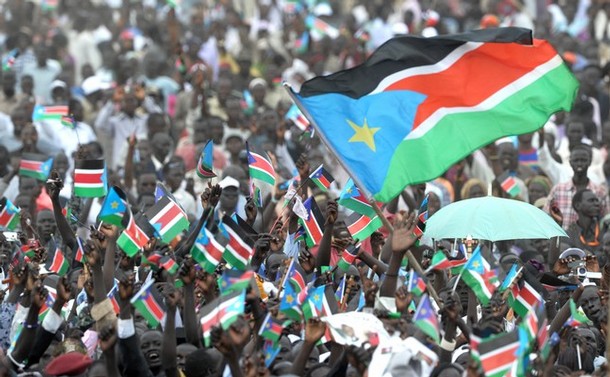The birth this past weekend of the Republic of South Sudan as the world’s newest independent state is, in many respects, a triumph for the Atlantic community’s diplomatic efforts in general and United States leadership in particular.
The acceptance of the possibility of secession was the central feature of the 2005 Comprehensive Peace Agreement (CPA) brokered by the Bush administration between the government of Sudan and rebels from the Sudan People’s Liberation Movement/Army (SPLM/A), ending—for the most part—a conflict that really began half a century before and which had ultimately taken the lives of at least two million people, mostly southerners, and caused millions others to be displaced. In addition to the United States, both the European Union as a whole and Italy, the Netherlands, Norway, and the United Kingdom as individual nations signed on as guarantors of the accord. While the euphoria occasioned by the fresh beginning is understandable, the question that these same parties need to dispassionately examine is what happens, both with the new nation and the one it left behind.
Despite possessing some considerable natural resources, seldom does a new state come into being suffering from as many disadvantages as those which hobble South Sudan. Not only is the Texas-sized territory totally landlocked and the nearest major seaport (in Mombasa, Kenya) some 3,000 kilometers away, but it is totally lacking in the infrastructure that might mitigate these disadvantages. The entire country currently has less than 100 kilometers of paved road. A USAID contractor is currently racing to complete the first road linking the capital, Juba, to at least one neighboring country, Uganda. Despite the fact that it possesses more than eighty percent of Sudan’s proved petroleum reserves—the fifth largest such in all of Africa—very little of this wealth was shared with the South until the last few years and hardly any of this latter amount has trickled down to South Sudan’s ten million people, ninety percent of whom are illiterate and roughly the same proportion of whom currently live on less than one dollar a day. While eighty percent of the South Sudan is arable, less than ten percent of it is cultivated and not particularly productively either, leaving about half the population dependent on food aid.
Nor is it particularly evident that the nearly $6 billion that the international community has pledged in aid to South Sudan since the 2005 peace accord has been particularly effective, except perhaps to maintain the legion of international NGOs which have flocked there and driven up the costs of doing business in Juba to surreal heights. In fact, in combination with the “curse” of resource wealth, the lavish aid may have hitherto perversely relieved South Sudanese leaders of any sense of urgency regarding the private-sector development their new country desperately needs if it is to grow its economy and the transparent, democratic institutions required for its political legitimacy and good governance.
Furthermore, politically and militarily, the new country is still at odds with the one it seceded from and open conflict remains a very distinct possibility, despite a last-minute agreement to deploy Ethiopian peacekeepers along the still-disputed borders between Sudan and South Sudan.
Without South Sudan, the rump state in the North faces severe challenges of its own. Even assuming that some sort of revenue sharing agreement is reached with the South which, after all, needs an outlet to export its oil, the North’s share of the revenues will inevitably be less than what has been in the past. Thus the regime of President Omar al-Bashir needs to engage in significant belt-tightening at a moment when its economy is already under strain because of a shortage of foreign currency and higher prices for the goods it must import. Compounding the North’s problems is the isolation it faces because its leader is under indictment for war crimes by the International Criminal Court, to say nothing of the effects of a $36 billion external debt, largely in arrears, that effectively cuts it off from any access to multilateral financial institutions like the World Bank or the International Monetary Fund.
Moreover, South Sudan’s successful secession will, undoubtedly, embolden various rebel movements in the North, although, somewhat ironically, it will also, at least in the short term, enable the ruling National Congress Party to tighten its hold on the reins of power since the vacating of the SPLM’s seats leaves it with an overwhelming supermajority in the National Assembly in Khartoum. Confronted by the severe challenges it now faces, it will be very tempting for the regime, especially if it feels it has no other viable options to ensure its survival, to try to distract attention from these woes by fomenting conflict with its new neighbor.
While the United States and other partners of South Sudan have helped to win freedom for the peoples of South Sudan, the challenge now is for them to consider what can be done to assure that political independence is not followed by state failure and/or conflict, but rather that there be a real chance for the improved human security and geopolitical stability, the promise of which justified the international community’s recognition of the breakup of a sovereign state in the first place.
J. Peter Pham is director of the Michael S. Ansari Africa Center at the Atlantic Council..
Image: southsudan.jpg
